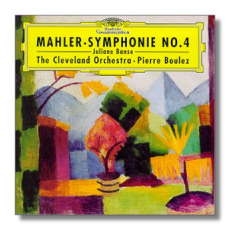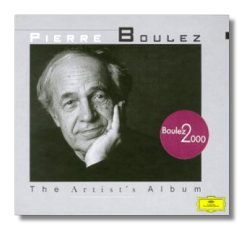
The Internet's Premier Classical Music Source
Related Links
- Mahler Reviews
- Latest Reviews
- More Reviews
-
By Composer
-
Collections
DVD & Blu-ray
Books
Concert Reviews
Articles/Interviews
Software
Audio
Search Amazon
Recommended Links
Site News
 CD Review
CD Review
Pierre Boulez Conducts

Gustav Mahler
- Symphony #4
Juliane Banse, soprano
Cleveland Orchestra/Pierre Boulez
Deutsche Grammophon 463257-2 DDD 53:32


Boulez 2000 - The Artist's Album
- Richard Wagner: Parsifal (Vorspiel 1. Aufzug) 1
- Arnold Schoenberg:
- Moses und Aron (Auszüge) 2
- Herzgewächse, Op. 20 6
- Maurice Ravel:
- Rhapsodie espagñole #3 "Habanera" 3
- Pavane pour une Infante defunte 5
- Béla Bartók: Concerto for Orchestra (4. Satz) 4
- Claude Debussy: Images #2 "Iberia" 5
- Gustav Mahler: Symphony #7 (3. Satz) 5
- Hector Berlioz: Symphonie fantastique, Op. 14 (2. Satz - Ein Ball) 5
- Igor Stravinsky: Le Sacre du Printemps (Danse sacrale) 5
- Olivier Messiaen: La ville d'en haut 5
- Alban Berg: Lulu (Auszüge) 7
- Pierre Boulez: Repons 6
1 Bayreuther Festspiele Orchestra/Pierre Boulez
2 BBC Symphony Orchestra/Pierre Boulez
3 Berlin Philharmonic Orchestra/Pierre Boulez
4 Chicago Symphony Orchestra/Pierre Boulez
5 Cleveland Orchestra/Pierre Boulez
6 Ensemble Intercontemporain/Pierre Boulez
7 Orchestre du Theatre National de l'Opera Paris/Pierre Boulez
Deutsche Grammophon 457693-2 ADD/DDD 80:48
Boulez's newest Mahler recording has appeared at about the same time as an RCA Living Stereo reissue of Fritz Reiner's classic 1958 account with the Chicago Symphony Orchestra (09026-63533-2). Both recordings feature brisk tempos (Reiner's total timing is 53:44), and both are examples of relatively objective interpretation. Heresy it may be, but I find myself greatly preferring Boulez's. The more I listen to it, the more I find myself thinking that this is the studio-made recording I would prefer hearing to any other. (I must add the qualifier "studio-made" because of an incandescent live recording with Sir John Barbirolli that was issued a few months back – BBC Legends BBCL4014-2.)
From the very start of the first movement, Boulez and the Cleveland Orchestra make the music sound fresh and unaffected. There is joy here. Nevertheless, there's also variety, and no recording in my memory covers so broad an emotional range in the first movement alone. Nothing is forced or self-indulgent; Boulez's hand can be felt in this music-making, supporting but not pushing. He does much to keep Mahler's textures airy, and even lightly scored passages are revealed to have harmonic intriguing ambiguities that are obscured in other recordings. The orchestra responds to every gesture with infinite sensitivity. The Clevelanders distinguished themselves in this score with George Szell in 1966 (Sony Classical SBK46535), and here they outdo themselves with playing that is precise but never clinical. Under Szell, they were never this melting. Concertmaster William Preucil excels in the second movement. Many soloists play the scordatura violin solos with self-defeating plainness; Preucil makes it very clear that this is no ordinary violin, and that this indeed may be Death who plays it! The third movement is an unbroken, unhesitating ascent into Paradise, and the final movement finds us serenely lodged there. Soprano Juliane Banse's fruity voice is neither childish nor stereotypically innocent, but her diction and sensitivity to words are exquisite.
As usual when Boulez records in Cleveland, the engineering is excellent: warm, detailed, and exciting in the third movement's grand climax. The booklet notes are by Mahler expert Henry-Louis de La Grange, and they include the reactions of early critics to this music; one called it a "medley" of "symphonic cabaret acts"!
The second CD listed here has been issued in honor of the conductor's 75th birthday. It's in a handsome hardcover book format, with an essay about the conductor in English, German, and French, and the disc itself in a pocket in the back. None of the material on the CD is new (except for Ravel's Pavane – a recording not released until now). There's quite a range of music here: from the Parsifal Prélude to the Orgy Scene from Moses und Aron, with Messiaen, Berg, Debussy, Stravinsky, Bartók, Mahler, Berlioz, and Boulez himself (as a composer) making appearances. The recordings are presented in chronological order; Parsifal is the earliest, recorded at Bayreuth in 1970. This arrangement doesn't make for a very coherent listening experience. Yet the goal of this CD – I think – is to show Boulez's excellence in several areas of repertoire, and the goal is achieved. This is the kind of CD that becomes a collector's item, so if you a Boulez fan – or just a speculator – you should consider this.
Copyright © 2000, Raymond Tuttle




















